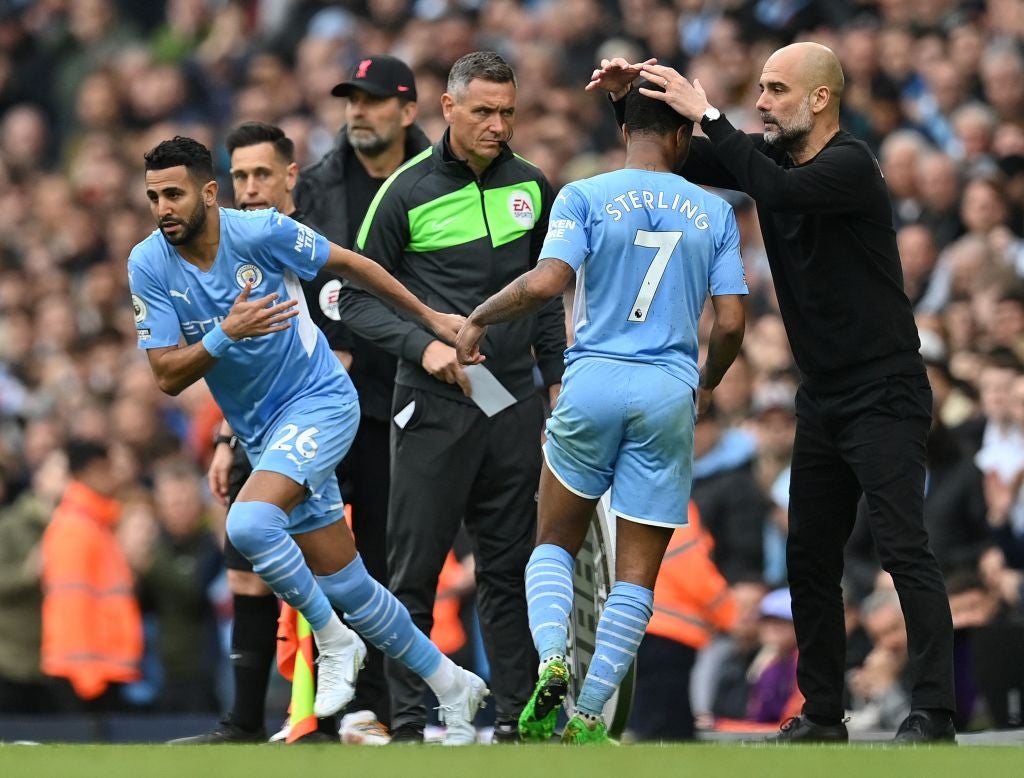What Man City’s willingness to sell to key rivals says about Pep Guardiola
The transfers of Raheem Sterling, Gabriel Jesus and now Oleksandr Zinchenko represents a departure for City, and the ultimate example of Guardiola backing himself from the bench

It was a title won from the bench, by four men who started on the sidelines. Pep Guardiola remained there, too – he has made some leftfield moves in his time but bringing himself on at 51 minutes would have been a stretch too far – but his replacements made the difference. Ilkay Gundogan scored twice. The first was set up by Raheem Sterling, another who was brought on. Sandwiched by the German’s brace came a goal for Rodri; the assist, with a precise cutback capping an influential display in the second half, came from Oleksandr Zinchenko.
In the aftermath of Manchester City’s 3-2 win over Aston Villa to win the Premier League on the final day of last season, it did not go unnoticed that Guardiola had turned to Zinchenko, Gundogan and Sterling ahead of the £100m man, Jack Grealish. Two months on, it assumes another importance. They proved Zinchenko and Sterling’s valedictory contributions in a City shirt. Gabriel Jesus started that day, but the Brazilian proved a placeholder until Erling Haaland’s arrival.
Now each will play his home games in London this season, the Ukrainian and the Brazilian for Arsenal, the Englishman for Chelsea. Sterling could have been joined at Stamford Bridge by Nathan Ake, had Chelsea been prepared to match City’s asking price and Guardiola been able to find a suitable successor.
If one pertinent point is City’s willingness to sell to domestic rivals – or, to put it another way, the fact that Premier League clubs are paying them some £120m, more than funding the transfer fees for Kalvin Phillips, Julian Alvarez and Haaland – another is Guardiola’s willingness to cull his squad players, to dispense with the trusted who have made crucial interventions even when not automatic choices.

The most significant departures of his reign had tended to fall into two categories. First came those who, through either age or limitations, looked imperfect fits for his brand of football and were reasons why his debut season was so underwhelming. There were also the annual exits of the greats he inherited, who propelled City to another level and without whom they may not have had the prestige to attract him, in Pablo Zabaleta, Yaya Toure, Vincent Kompany, David Silva and Sergio Aguero. Fernandinho was the 2022 addition to that distinguished band.
Yet this summer’s other exits belong in a very different category. The superb six left well into their thirties, after around a decade’s service each, but without recouping City any money. The London-bound trio have gone in their mid-twenties – at 27, Sterling just about qualifies – and while boosting the budget.
At his best, Sterling belonged in the bracket of the outstanding City players. Jesus and Zinchenko were very useful ones, each capable of excelling in defining games, able to be first choices for periods of time but looking likely to be back-ups this season. Contractual reasons, with Sterling entering the last year of his deal, help explain the moves.
But so does preference. Guardiola paid generous tribute to all three and, while Sterling’s frustrations at being benched were occasionally apparent, Zinchenko and Jesus were the kind of uncomplaining loyal soldiers he likes. There can be an unsentimental element to Guardiola – perhaps he cannot be as emotional about any other club as much as Barcelona – and he can be willing to offload constants in his trophy-winning squads.

Like Jurgen Klopp, he takes the view that those who want to go can, provided it suits the club. Perhaps the surprise, given how much they have won and how well they are paid, is how many have eyed the exit. Last summer, Guardiola admitted Bernardo Silva and “two or three” others hoped to go. Sterling and Ake may have been among them. At various points, Joao Cancelo, after his unsuccessful debut campaign, Aymeric Laporte and maybe Riyad Mahrez and Gundogan have hoped to find alternative employers.
All of which forms a break from Guardiola’s past. In part because he has managed destination clubs when they have been hugely successful, he has rarely sold those who were involved regularly. He began at Barcelona with a display of brutality, exiling Ronaldinho and Deco, but major departures were infrequent thereafter: maybe only Toure, Samuel Eto’o, Zlatan Ibrahimovic, after the rapid breakdown of his relationship with the manager, and an ageing Thierry Henry. At Bayern Munich, he parted company with Toni Kroos, Mario Mandzukic, who was being replaced by Robert Lewandowski anyway, and an ageing Bastian Schweinsteiger.
Part of the difference at City lies in his longevity. Guardiola only really had one team each in Catalonia and Bavaria. There is a case for arguing he has already had two in Manchester, given the roles Kompany, Silva, Aguero, Fernandinho, Sterling, Nicolas Otamendi, Fabian Delph and Leroy Sane played in the period between 2017 and 2019.
Certainly there is the argument that sustaining success necessitates changing either the players or the manager and at City the continuity is coming in the dugout. The thinker in Guardiola likes the intellectual challenge of customising his tactics to suit different talents. Sterling, Jesus and Zinchenko are three who have been pet projects, each reinvented by him. They played a combined total of 656 games for him. That each is leaving in his prime points to a different dynamic in Guardiola’s management. When he looks to the bench this season, he will see different faces and other ways of altering games.



Join our commenting forum
Join thought-provoking conversations, follow other Independent readers and see their replies
Comments